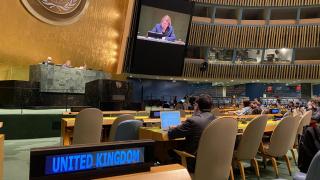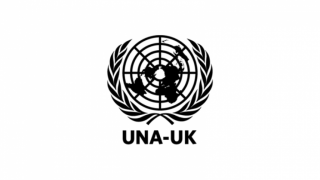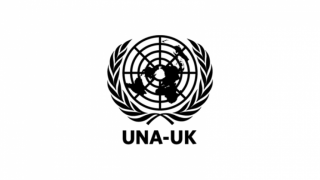
Today 19 states will be elected to the UN ECOSOC Committee on NGOs for the 2023-2026 term. It is vital that the body - which is mandated to accredit NGOs to the UN - is fit for purpose.
Ahead of the NGO committee elections, for which the UK is standing as an uncontested candidate, UNA-UK spoke to Megan White, Human Rights Policy Advisor and Civil Society lead for the UK Mission to the UN.
Tell us about your role as civil society lead for UKMIS - what are your main objectives?
My main objective is to give CSOs more opportunities to participate at the UN. This is mainly approached through two avenues: organising HLMs (which we do through what are called modalities resolutions), as described above, and the NGO Committee.
On the former, I work with a group of member states who also favour greater and transparent CSO participation to ensure that principle is reflected in every possible modalities resolution.
On the latter the UK is a candidate for the Committee and we hope to use our membership to make the process of Member States reviewing NGO applications for accreditation more transparent and efficient.
Our work to make modalities resolutions more fair has been particularly satisfying because success is measurable by the number of votes, and we see how we’re making it easier for civil society organisations to participate.
Civil society organisations are critical to UN efforts to address global crises. What has the UK done to support civil society access and engagement to the United Nations in recent years and what would you like to see happen in the future?
For high-level meetings (HLM) at the UN, we noticed a worrying trend over the last decade by some Member States to restrict civil society participation. Civil society organisations work on the ground, delivering programmes, collecting evidence and more, so their participation is really important to reflect the reality that every day people face.
The resolutions setting out how these meetings are organised often allow for member states to block any NGO from participating in a given HLM, without any transparency. This had a real world impact, by closing down the number of non-member state voices at the UN. For example, a handful of member states denied access to 22 NGOs to a 2016 HLM on HIV/AIDS.
The UK decided to push back. With a group of likeminded states, the UK led efforts to secure more expansive access for NGOs at the 2021 HLM on HIV/AIDS and we won with 77 votes in our favour, 40 against. This success set a new standard for organising HLMs at the UN – and we have retained this more progressive language in resolutions for six subsequent HLMs, allowing more NGOs to have a voice in UN discussions.
We welcome the UK standing as a candidate to serve on the NGO Committee given the UK’s strong track record of championing civil society at the UN. However, the list of candidates for the Committee includes states with questionable records on civil society support. What can be done to ensure the Committee is considering applications for accreditation in a fair, non-discriminatory and expeditious manner? What will the UK do to address the longstanding issues to do with the politicisation of the Committee?
The UN is the only forum in the world where every country has a seat at the table to discuss these issues. While we disagree with many states on many things, it’s important we do have the discussion, and see it as an opportunity to push global norms and standards in the right direction.
We encourage all member states to vote with integrity. However the Committee’s working methods do make it possible for states with regressive views toward civil society to delay applications via arbitrary deferrals. This leads to backlogs and years-long application processes, with several NGOs deferred for more than eight sessions. The UK wants to prevent this. Changing the working methods of the Committee would require an ECOSOC resolution. We hope to work with like minded member states to discuss how we can do that.
The NGO Committee is elected by members of ECOSOC. Only one region (Eastern Europe) has a competitive slate. UNA-UK has been a consistent advocate of competitive UN elections as a means of driving up standards and ensuring that states with the most to offer a given agenda are elected. What is UKMIS’s position on blank slates in UN elections, including for the NGO committee?
The UK supports competitive slates, as it forces candidates to defend their record. Although we are running for the NGO Committee on an uncontested slate, we are not taking our position for granted – and have committed to using our membership to push for more NGO access at the UN.
UNA-UK has joined ISHR in calling on the 54 members of ECOSOC – the parent body of the NGO Committee – to commit only to vote for States that they believe will fulfil the mandate of the Committee with sincerity. Many of those states standing for election have ‘closed’ or ‘repressed’ CSO space, according to the assessment of NGO Civicus. Has the UK published any information on its vision for the NGO committee? Have other states?
The UK aspires to a Committee that is more efficient, more equitable, and less susceptible to politicisation.
Last year the UK supported the #UNmute civil society initiative which called for 6 proposals to support civil society including the appointment of a UN high level champion for civil society - a key proposal UNA-UK is advocating for. Will this be an area you will continue to push in the future?
The UK is very supportive of efforts to expand civil society participation at the UN. We welcomed that the Secretary-General’s Our Common Agenda report called for a more inclusive multilateralism, including a proposal to instil civil society focal points in all UN bodies. We look forward to the implementation of this call and hope that it has a positive impact on the ability for civil society to engage with the UN.
Read more:
- UNA-UK joins the call for competitive UN ECOSOC NGO Committee elections
- Read about International Service for Human Rights’ #OpenTheDoors2NGOs campaign here
- Learn more about the Committee on NGOs here
- The UK Mission to the UN on civil society participation
Photo: A view of the UK Mission to the UN's desk in the UN General Assembly Hall. Credit: Joyce Bukuru/UK mission to the UN






